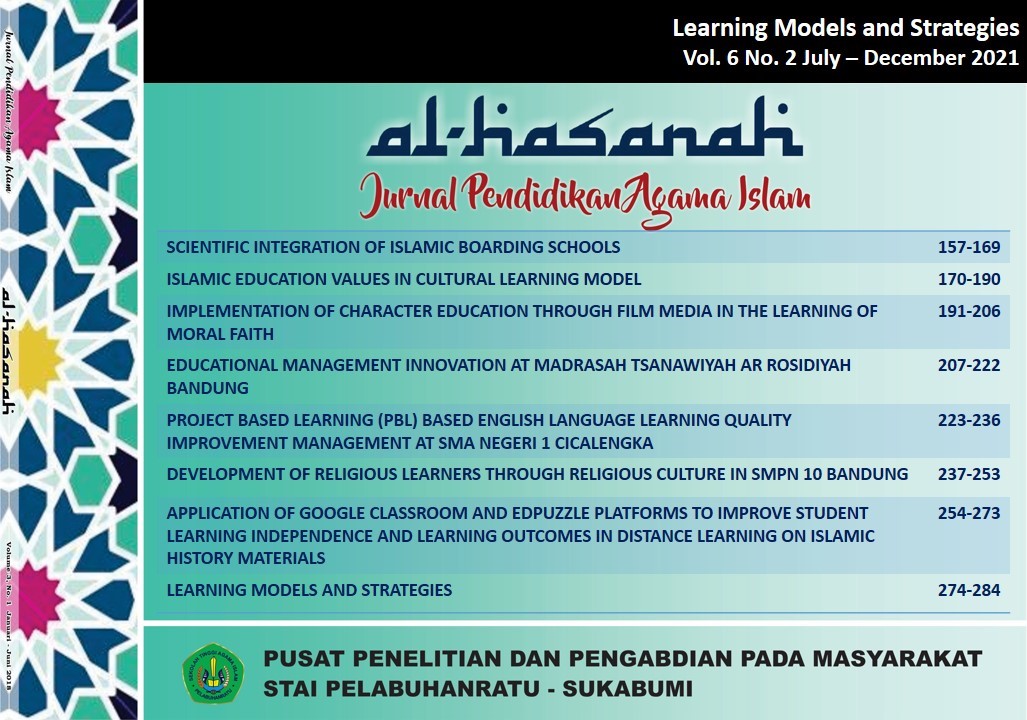PENERAPAN PLATFORM GOOGLE CLASSROOM DAN EDPUZZLE UNTUK MENINGKATKAN KEMANDIRIAN BELAJAR DAN HASIL BELAJAR SISWA DALAM PEMBELAJARAN JARAK JAUH PADA MATERI SEJARAH ISLAM
DOI:
https://doi.org/10.51729/6245Keywords:
Google Classroom Platform, Edpuzzle, Learning Independence, Learning Outcomes, Distance Learning, Islamic HistoryAbstract
This research is motivated by the low learning independence and learning outcomes of students in teaching and learning activities of Islamic Religious Education in distance learning. Based on the preliminary study, it is known that there are still around 40 percent of the average for each class, students who do not participate in learning activities. At the end of the semester assessment, it is known that there are still 50.43 percent of students who score below the minimum completeness criteria. This study aims to describe the application of the google classroom and edpuzzle platforms in PAI subjects. The research approach used is a quantitative type of experimental study in the form of a quasi-experimental model of nonequivalent pre-test and post-test control group design. The research population is class XI IPA SMAN 4 Sukabumi and the samples are class XI IPA 5 experimental group and class XI IPA 4 control group. The research instrument used was a questionnaire of 45 questions, a test of 25 items, observations, interviews and documentation. Data were analyzed using statistical tests. The results showed that the implementation of the google classroom and edpuzzle platforms could be carried out properly according to the stages of learning planning. Students' learning independence with the implementation of the google classroom platform is in good category with an average pretest score of 59.25 and an average posttest score of 79.20 which has increased by 20.05 percent, while the class independence score using the lecture method is in the sufficient category. the average pretest score was 57.55 and the posttest score was 67.85, an increase of 10.29 percent. Cognitive learning outcomes of students with the application of the google classroom and edpuzzle platforms in the very good category with an average pretest score of 77.03 and an average posttest score of 84.67, an increase of 7.64 percent, while the results of classroom learning using the method lectures in the good category, with an average pretest of 77.43 and an average posttest value of 79.51 and an increase of 2.08 percen.
Downloads
References
Amaliah. (2020). Implementation Of Edpuzzle to Improve Students Analytical Thinking Skill in Narrative Text. Jurnal Prosidi, 14(1), 35–44.
Basri, H., & Saebani, B. A. (2010). Ilmu pendidikan Islam. Bandung: Pustaka Setia.
Budiarto, I. D. (2020). Penggunaan Startegi Pembelajaran Filpped Classroom secara Daring Berbantuan Media Edpuzzle untuk Meningkatkan Pemahaman Materi Hukum Dasar Kimia Siswa Kelas X. Prosiding Seminar Nasional Kimia (SNK) 2020, 110. Surabaya: Jurusan Kimia FMIPA Universitas Negeri Surabaya.
Creswel, J. W. (2014). Research Design: Pendekatan Kualitatif, Kuantitatif, dan Mixed. Yogyakarta: Pustaka Pelajar.
Hergenhahn, B. R., & Olson, M. (2008). Theories of Learning. Jakarta: Kencana Prenada Media Group.
Hikmawati, F. (2019). Metodologi Penelitian. Depok: PT RajaGrafindo Persada.
Margono. (1997). Metodologi Penelitian Pendidikan. Jakarta: Rineka Cipta.
Matlin, M. W. (2009). Cognitive Psychology. Denver: John Wiley & Sons.
Moleong, L. J. (2017). Metodologi Penelitian Kualitatif. Jakarta: PT Remaja Rosdakarya.
Nurmila, N. (2020). Paradigma Positivisme dan Postpositivisme. Bandung.
Schunk, D. H. (2012). Learning Theories. Yogyakarta: Pustaka Pelajar.
Sukmadinata, N. S. (2012). Metode Penelitian Pendidikan. Bandung: PT Remaja Rosdakarya.
Syah, M. (1995). Psikologi Pendidikan Suatu Pendekatan Baru. Bandung: PT Remaja Rosdakarya.
Uno, H. B. (2009). Model Pembelajaran: Menciptakan Proses Belajar Mengajar yang Kreatif dan Efektif. Jakarta: Bumi Aksara.
Uys, W. F., & Chigona, W. (2020). Evaluating Undergraduate Studens’ Self Directed Learning Experiences During Research-Based Learning’. in E. Mentz & R. Bailey (eds), Self-directed learning research and its impact on educational practice (Vol. 3; E. Mentz & R. Bailey, eds.). Retrieved from https://books.aosis.co.za/index.php/ob/catalog/book/206

Additional Files
Published
How to Cite
Issue
Section
License

This work is licensed under a Creative Commons Attribution-ShareAlike 4.0 International License.
Authors who publish with this journal agree to the following terms:
- Authors retain copyright and grant the journal right of first publication with the work simultaneously licensed under a Creative Commons Attribution 4.0 International License. that allows others to share the work with an acknowledgement of the work's authorship and initial publication in this journal.
- Authors are able to enter into separate, additional contractual arrangements for the non-exclusive distribution of the journal's published version of the work (e.g., post it to an institutional repository or publish it in a book), with an acknowledgement of its initial publication in this journal.
- Authors are permitted and encouraged to post their work online (e.g., in institutional repositories or on their website) prior to and during the submission process, as it can lead to productive exchanges, as well as earlier and greater citation of published work.



















